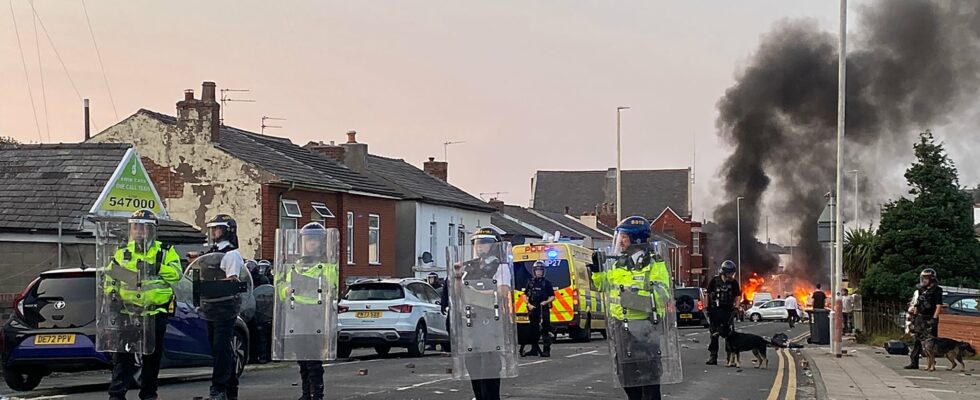A police station and shops were set on fire and looted by protesters who, armed with stones and glass bottles, attacked police officers. The scene took place on Saturday, August 3 in Sunderland, a city in eastern England. But other demonstrations, marked by similar violence, took place in many other parts of the country, from London to Manchester, and as far as Belfast, in Northern Ireland. What do these gatherings have in common? Anti-immigration and anti-Muslim slogans.
The United Kingdom experienced its sixth day of riots on Saturday. They began after the stabbing of three girls in Southport, in the northwest of England, on Monday, July 29. Shortly after, rumors began to circulate, relayed by hard-right figures, about the religion and identity of the alleged attacker, Axel Rudakubana, a 17-year-old boy. A police denial, denouncing false information, was not enough to calm this outbreak of violence.
Police officers injured, streets ransacked
In Liverpool, a popular city in the northwest of the country, protesters threw chairs, bricks and other projectiles at police, an AFP photographer noted. “Several police officers were injured while dealing with serious disorder in Liverpool city centre,” Merseyside police reported on X.
In Manchester, there were scuffles between protesters and police, who were trying to prevent clashes with counter-protesters. In Nottingham and Belfast, police also had to intervene between violent groups. In Hull, in the north-east, the windows of a hotel used to house asylum seekers were smashed, according to the BBC. Several police officers were also injured during “serious disturbances” in Liverpool city centre, where bricks, bottles and a flare were thrown. Two officers were taken to hospital, reports The Guardian.
In total, more than 90 people were arrested across the country on Saturday, according to the BBC. “Some of the suspects and those responsible (for the violence) have already been arrested, charged and are in custody, and this is just the beginning. People have a right to feel safe,” Home Secretary Yvette Cooper told British media. Concern is particularly high among Muslim religious leaders, as a mosque was targeted in Sunderland on Friday, as was the case in Southport in earlier clashes on Tuesday.
From social networks to the street
The authorities and many politicians have strongly condemned the violence, with the Home Secretary promising that the rioters “will pay the price for their violence and thuggish behaviour”. Keir Starmer, who has been Prime Minister for just a month, held an emergency telephone meeting with his senior ministers and said there could be “no excuse for violence”, according to a Downing Street spokesman. He also reiterated his support for the police to take “whatever action is necessary to keep the streets safe”.
Many politicians and association leaders have also denounced the influence of disinformation in these clashes, and the responsibility of social networks, first and foremost X. “One of the key factors in this spread of disinformation online was Elon Musk’s decision to allow right-wing activists such as Tommy Robinson to return to his social media platform X,” said Joe Mulhall, research director at Hope not Hate, an anti-fascist organization. According to The Guardianactivist Tommy Robinson organized a protest in London, attended by more than 20,000 people. “We haven’t seen a gathering like this since 2018” and his ban from Twitter, analyzes Joe Mulhall.
According to several British media reports, Technology Secretary Peter Kyle has spoken to social media companies about misinformation being spread online. “Clearly we need to do more because, you’re absolutely right, there has been this spread of misinformation that has caused problems this week,” the Minister of State for Crime and Policing told a BBC reporter on Saturday.
For the secretary general of the Muslim Council of the United Kingdom, Zara Mohammed, these tensions are the result of a “widespread anti-migrant and Islamophobic sentiment”, including among the political class, she told AFP on Friday. During the last general election in July, and while the fight against illegal immigration was at the heart of the campaign, the anti-immigration party Reform UK made a surprise breakthrough, sending five MPs to Parliament.
